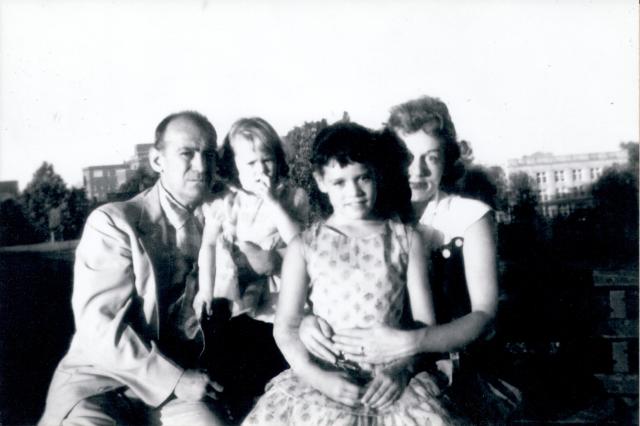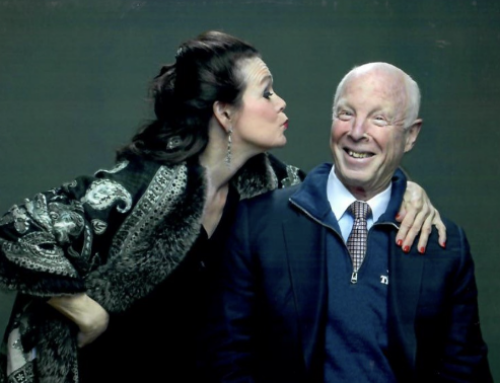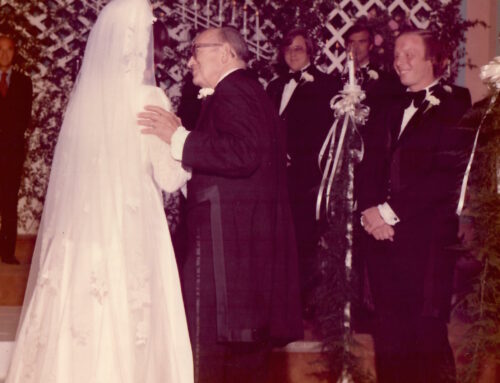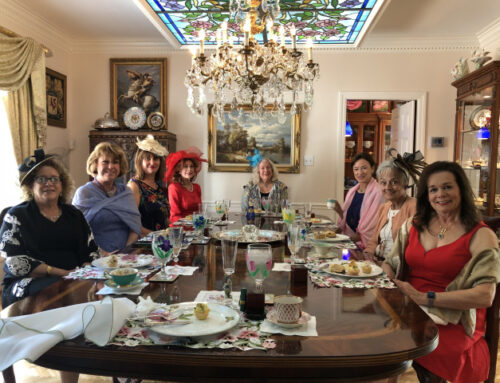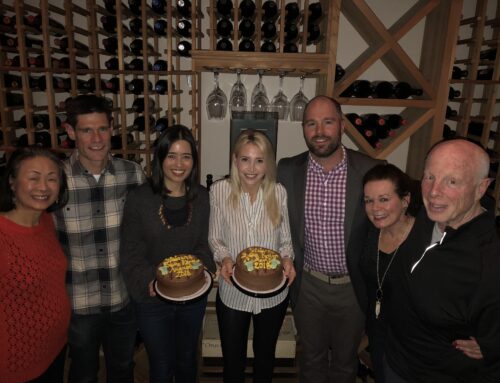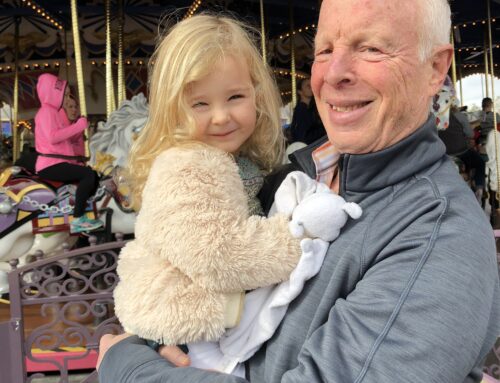Applause was ringing in my ears. I took my second bow, and then the whole cast joined me on stage. The trees, birds and bumblebees flanked me as I curtsied one more time. I really did feel like a princess as I held my crisp satin dress between my fingers, fanning it out in all its beauty for the crowd to admire. My mother had made my costume on her Singer sewing machine. I had chosen the shiny, hot pink fabric because when I ran my fingers over it, it turned purple. My princess costume had rhinestones, too, which made prisms like a kaleidoscope and glared in my eyes as the lights caught them. All I could see when I looked out from the stage were big halos of light, floating like angels above the ghostly heads in the auditorium. As the red tulip on my left and pink rabbit on my right took my hands, the clap-clapping of the crowd coupled with the twinkling jewels on my dress, made me feel like I was dreaming. I smiled so hard my cheeks hurt, and we stepped forward for our last bow.
As I brought my head up from my deep curtsy, I strained to see my mother.
But it was no use. I was blinded and besides, we were taught never to look at their faces, only above them. I’m sure that’s why I couldn’t see my mother. I had peeked out before the play started and could not see her through the tightly packed crowd. But, I knew she was was there. And I knew she was proud of me. I stepped back and the curtain closed on our one and only production of The Discriminating Princess. I was that princess.
Ten weeks earlier, my teacher Mrs. Epstein distributed scripts and announced our parts. She said we needed to underline our character’s lines, and she gave us each pencils so we could start. Well, I was underlining like crazy. What? Am I on every page? I was on every page. You see, it was MY garden, and all the other kids were the flowers and animals that came in and out of my garden, the Princess’s garden. I was so excited I raised my hand.
“May I go to the bathroom, Mrs. Epstein?” I asked. She told me I could but to hurry up. When I got nervous, I always had to go. When I came back, she said class was over and that we should work on memorizing our lines before the next week’s rehearsal.
“The show opens in six more weeks,” she said. “So you must work very hard to learn your lines.”
“Yes, Mrs. Epstein,” we all said in unison. And with that we were dismissed, and I was the first one out the door, looking for my dad’s car.
All the other kids got picked up before I did, and I was embarrassed that Mrs. Epstein had to stay with me on the porch until my dad showed up.
“You deserved the part, Nancy,” Mrs. Epstein said, “You did a very good reading at the audition.”
“Thank you.” I looked down at my black patent leather shoes and back up again, smiling real big so she could see my dimples. Why was my Dad taking so long?
“You obviously love the theatre.”
“Oh, yes, and I wanna be an actress when I grow up.”
“Well,” she started–and I was hoping to hear her say, “You most certainly will…” but my Dad had just pulled up.
“Good-bye, Mrs. Epstein. I’ll work on my lines.”
Jumping in the car, I waved to her, “See you next week.”
I couldn’t wait to tell Dad about the play. He said, “Oh that’s nice.” He didn’t get as excited about things as my Mom did. But she didn’t drive, and she was home with the little kids.
All the way home I was thinking about how happy this would make her. She was sad most of the time, because my sister had died that winter, and I knew she was trying to make ME happy by signing me up for this Junior Theatre class. Acting did make me happy–not as happy as having my sister come back to life, but I knew that was impossible.
“Mom,” I yelled, running in the door, “I got the part.”
“What? The Princess?”
“Yes, I’m going to be the Princess. I’m so haaaapy,” I said, jumping up and down.
Mom hugged me hard–she did that a lot now, and I wasn’t surprised when I pulled away from her that she was crying. She often cried—mostly because she was sad, but today it was because she was happy. I was sure of that.
Mom made my favorite lunch of cream of tomato soup and grilled cheese sandwiches. I sat next to my little brother John, and as I crushed the saltine crackers and dropped them in my soup, I sang: “Animal Crackers in my Soup….” Johnny yelled, “Mom, make her stop. I hate that song.” I continued singing anyway. Johnny would never understand how happy I was. He didn’t care about plays like I did.

Me with My Mom, Dad and Sister Maribeth in Forest Park Before the MUNY
Later, I sang “Toyland, Toyland, wonderful girl and boy land, once you cross its borders, YOU can Never return again!” It always made ME cry. I had just seen it with Mom at the Muny Opera that summer. We always sat in the free seats, where it was hard to see the actors’ faces, but I could imagine what they looked like, and I loved all the costumes. When I heard that song, I started crying… I didn’t like the idea of growing up, and not being able to return to childhood. I was like Peter Pan. I had looked over at my Mom, who was crying too, but I knew it was for a different reason. She was crying because my sister never would grow up. Looking at her crying made me cry harder. I leaned over to comfort Mom and wiped my tears on her shoulder, but it was a hot summer night, and she had no sleeves on.
“Sorry, Mom,” I whispered, and I wiped her arm with my white gloves that I always wore to the opera. I knew the snot would come off in the wash.
“That’s okay, honey,” she whispered. Then the drums played and the toys came to life and the colors and lights and music drew us both in a trance to the stage, taking our minds off Licia. That’s what I loved about theatre. It could take you anywhere–and make you forget the sad things that happened.
The next night, we were going to work on my lines after dinner. I couldn’t wait, so I jumped up right after we finished dinner to start the dishes, without Mom even having to ask me. This was when I really missed my sister. We alway did the dishes together and got the giggles making bubble beards on each other’s faces with the dish soap. My little brother was too young to help me, so I just did them alone. Sometimes I sang songs–The Shirley Temple ones, or ones I learned in school, or else I listened to music on our kitchen radio. That is, if Dad wasn’t listening to the ballgame–which he usually was. I loved watching Shirley Temple and singing all her songs over and over until my little brother said, “Stop. No more Lollipop!” But I just kept on singing, and at night I would dream I was in the movie, singing and dancing with my sister.
The next week at class we did the “blocking,” which means the director told us where to go on stage when we said our lines. She taught us all the stage directions–upstage for when you walk to the back, and downstage when you walk in the direction of the audience. Then we learned: stage left, stage right, and center. I made all the markings in pencil in my script. This was a lot of writing, because I was always on stage, and the other kids walked into my garden and talked to me. I was the Princess in The Discriminating Princess–a big word meaning I was pretty choosy about who I’d let into my garden.
Mrs. Epstein was always yelling at the other kids to be quiet when they were not on stage, but she didn’t have to yell at me, because I was always on stage. I did a great job at rehearsals. I knew my lines before anybody else, even though I had ten times more. Mom made me say them every night, which got boring, but she always promised me that afterwards, I could stay up late with her and watch a movie and have some popcorn–my second favorite thing to do besides going to the theatre.
Mrs. Epstein said she really liked my costume and that it “befitted” a princess.
“Yes, Mom made it to fit me perfectly,” I said. “She is a really good sewer.” I twirled in it for her and kept twirling until I twirled right into the cutest boy in the class. I was so embarrassed. He jumped back, just like the frog he was in the play–and Mrs. Epstein laughed and said, “Jimmy, you’ve really got your frog jump down perfectly–and Nancy, you had better get out of that princess dress now. If you run into any more animals, you will look like the INdiscriminating Princess on opening night.” I didn’t know what that meant, but it did not sound good, so I quickly went to change back into my regular clothes.
The big day finally arrived. My dad dropped me off at the theatre, and I was surprised to get there to see some big kids, like teenagers, on the stage practicing a fashion show. They were doing “pivots” like I did when I was in the Easter children’s fashions show for Stix, Baer & Fuller. There were other big kids practicing speeches onstage, too. There were some kids who looked like Peter Pan and some who were dressed as witches.
We did a dress rehearsal of the whole show, which took three hours. That was longer than the show would take tonight, because they had to stop and start for what they called “light cues.”
Then we took a break for dinner. I ate a tuna fish sandwich, and Mom put my favorite dessert in my bag: Twinkies, which I shared with my friend Linda. She was pretty. She had bright red hair, which she wore in long curls like I did. She played a daffodil in my garden, wearing a bonnet of yellow petals which made her look like a baby, and it was hard not to laugh when I “planted” her on stage in my garden. I tried not to look her in the eyes when I said: “You are growing so tall and pretty, my little daffodil,” and then I pretended to water her. Now it was time to put our costumes back on. They announced “half-hour” until the play would start.
Mrs. Epstein said our play was going first.
When the curtain opened, I would be the very first person everyone would see. I can’t tell you I wasn’t nervous, because I was. I had already gone to the bathroom 3 times, but I knew I was ready.
“10 minutes,” the stage manager said over a loudspeaker. That meant it was time to walk over to the stairs at stage left, where I would make my entrance. The costumer helper tie my bow in the back and checked my makeup. She put a little more rouge and lipstick on me. She then gave me a Kleenex and blotted my lips like I saw my mother do. I smiled seeing the imprint of my lips.
“Five minutes,” the stage manager announced, and I walked slowly up the back stairs to the side of the stage and tried to peek out to see my mom. I couldn’t see her, but I knew she was there. She was so excited to see me in my “stage debut,” as she called it, that she bragged about it to all her friends.
Too bad Dad couldn’t see his “little princess” on stage. He had to stay home with my brother and baby sister. Since my Mom couldn’t drive, she had asked her friend Margery to come. My brother and I always made fun of Margery. We liked her alright, but she was fat and waddled when she walked, and we liked to imitate her walk. Mom laughed too, but said she was a dear friend and was in her wedding. Margery’s real problem was not HER weight, but that she made everybody else wait—that was my Dad’s joke. When she picked my mom up for dinner, my mom would sit in the living room in her dress-up clothes—smoking one cigarette after another, and pacing and looking out the window for Margery. She would sometimes show up an hour late, waddling slowly up our front steps.
I knew she would not be late tonight. Not on my big night–and Mom’s big night. I think she was as excited as I was.
I could hear all the voices still talking loudly in the audience and tried to listen for my mom’s voice and Margery’s funny laugh, but the voices were all jumbled together.
Mom didn’t know my play was on first. I could just picture her putting her hand over her mouth, almost gasping for air when she saw the curtain rise and ME standing there.
“Places,” I heard, and the butterflies began–that’s what they called that funny feeling in your stomach when you were really nervous.
The music started, and I walked to my spot on center stage. Then I saw the curtain go up, and I got chills as I started my first speech, shocked that the words flowed right out of my mouth–and perfectly–I said all the right things to all the right people and moved in all the right places. I even knew the other kids’ lines, and when they forgot, I whispered them softly so only they could hear.
It was so much fun being up there acting–I was in heaven!! If only Licia could see me-but then, I was sure she was watching me up in heaven. I guessed she had her fingers crossed for good luck, because I never missed a line.
I ran down the steps after the curtain came down, practically stomping on all the “flowers” in my garden. Now I had to wait over 45 minutes before I could go out and see my Mom–and see the big smile on her face. I played with the other kids–quiet games like tick-tack-toe and “telephone” to pass the time… until they called places again for the curtain call.
My cast bowed first, and this time I really tried to see Mom–but it was very dark in the back, and that was probably where she was sitting. As the final curtain closed, I ran down the steps and into the costume room to change– we were not allowed to come out to the audience in costume. Mrs. Epstein thanked us all for a great show and reminded us to take our costumes and personal things home. I barely heard her, because I just wanted to run out and see my Mom.
I spotted her as soon as I walked out–she was way in the back, and Margery was waving to me. I didn’t like the look on my mom’s face.
“Hi, did you like it? Was I okay? I remembered every line, Mom,” I said. “Thanks to you!” I hugged her hard. Something was wrong, because she was like steel, and didn’t hug me back.
“Well, honey.” (She looked like she was going to cry.) “We were a little late getting here.”
“Yes,” Margery said, “We didn’t know your play would go on first.”
“Well, I didn’t either, until tonight. But, you saw it, didn’t you?”
My mother could barely speak. “No, honey, I am so sorry we missed it.” And she was talking like she was really upset, kind of the way she talked at my sister’s funeral.
I hugged her. “Oh, Mom, I am so sorry you missed it. What happened? Is everything okay?”
“Well,” Margery said, “It was my fault. I had to stop to get gas, and I had no idea you would be on first.” She started to laugh.
I started to cry! But, I tried to hold back the tears, because I felt so sorry for my Mom, who was obviously so sad I couldn’t stand it.
People were filing past us–parents hugging their children and congratulating them–and three of the flowers parents asked if that was my mom.
“Yes,” I said, and each one said something like: “Oh, you must be so proud of her.” “You were wonderful…” “So many lines and you remembered them all.” “You were so expressive.” “ You really looked like a Princess!” I thanked them, trying to hide the tears in my eyes, which they probably thought were tears of joy, not sadness.
Then, Mrs.Epstein walked up and asked who my mother was. I introduced her and she said, “Your daughter is extremely talented. You must be so proud!
“Thank you,” my mom said weakly.
“Thank you, Mrs. Epstein.” I mustered my sweetest fake smile.
It was a long ride home. I sat in back, and only Margery talked, asking questions about some of the other actors and making comments.
My mother said nothing. Margery asked if we wanted to go get something to eat, but Mom quickly said, “No, thank you.”
She dropped us off and we said our goodbyes. I ran from the car, and Mom was right behind me. I heard her almost slam the door of Margery’s car.
When we got in the house, my Mom was crying so hard, yelling and telling Dad how she needed to learn to drive so she wouldn’t have to miss any more of Nancy’s plays.
“Don’t worry, Mom,” I said as I hugged her tight. “I will be in many more plays. I promise I will make you happy some day.”

